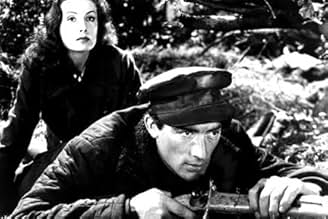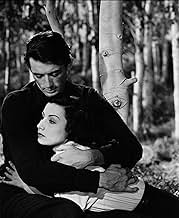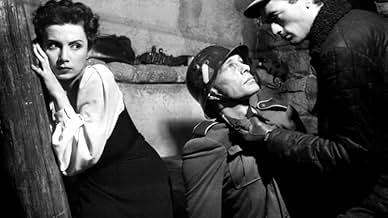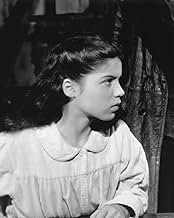NOTE IMDb
6,1/10
1,5 k
MA NOTE
Ajouter une intrigue dans votre langueA heroic guerrilla group fights back against impossible odds during the 1941 German invasion of the Soviet Union.A heroic guerrilla group fights back against impossible odds during the 1941 German invasion of the Soviet Union.A heroic guerrilla group fights back against impossible odds during the 1941 German invasion of the Soviet Union.
- Réalisation
- Scénario
- Casting principal
- Nommé pour 1 Oscar
- 3 victoires et 1 nomination au total
Tamara Toumanova
- Nina
- (as Toumanova)
Glen Vernon
- Mitya
- (as Glenn Vernon)
Edward L. Durst
- Petrov
- (as Edward Durst)
Maria Bibikov
- Vera
- (non crédité)
William Challee
- Ducrenko
- (non crédité)
Gretl Dupont
- Mariya
- (non crédité)
Charles H. Faber
- German Corporal
- (non crédité)
Erford Gage
- Col. Prilenko
- (non crédité)
Peter Helmers
- Von Rundhol
- (non crédité)
Adolf E. Licho
- Anton
- (non crédité)
Avis à la une
During the 1941 invasion of Russia by the Nazi's the odds are overwhelming as the German army marches across the land. However resistance among the brave Russians makes up with heart what it lacks in sophistication and size.
One such outfit is a small group of guerrilla soldiers lead by Vladimir. The new arrival of an 'outsider' creates tensions within the group but the capture of a German soldier offers the possibility of information and the potential for a demoralising strike at the invading army as well as his attempted escape helping the group trust one another again.
Perhaps understandably the Russian/German front has been largely ignored by Hollywood in the past few decades and even now it is possible that Days Of Glory is only increasing in circulation because the embarrassment factor has faded. During the cold war, nobody really wanted a WWII propaganda piece that shows the Russians (our enemy) as upright, heroic and American (!). However now we are all in the War on Terror together, I notice this film has started being seen more than it was ten years ago. I was attracted to this by the director and the presence of Peck however this is far from being one of Tourneur's famous films and Peck was in his first screen role. Essentially this is a big 'thank you' to the Russian soldiers by putting them in a story where they talk endlessly about why they are fighting while falling in love, looking heroic and sacrificing their lives. It is as basic and uninspiring as all that sounds and it smacks of a film that puts propaganda first and entertainment second.
This is not to say that it doesn't try because it does, with some action, some human drama and the standard wartime romance. It is not terrible but it does get a little dull at times and has far too much heavy handed preaching while the emotional music swells in the background. The cast features a surprising amount of people in their screen debuts I'm not sure if that was deliberate but it doesn't show that much. Peck shows the sort of furrowed brow and screen presence that made him a famous leading man while the rest of the cast do OK in average characters who are either jovial, heroic or brave depending on what point the film is trying to get across.
Overall this is an interesting film because it is unusual to see an American propaganda film bigging up the Russians. It has some involving action towards the end but mostly it is too talky and preachy, relying on music and heroic sacrifice to pull our heartstrings rather than writing real people who we can get emotionally involved with and care about.
One such outfit is a small group of guerrilla soldiers lead by Vladimir. The new arrival of an 'outsider' creates tensions within the group but the capture of a German soldier offers the possibility of information and the potential for a demoralising strike at the invading army as well as his attempted escape helping the group trust one another again.
Perhaps understandably the Russian/German front has been largely ignored by Hollywood in the past few decades and even now it is possible that Days Of Glory is only increasing in circulation because the embarrassment factor has faded. During the cold war, nobody really wanted a WWII propaganda piece that shows the Russians (our enemy) as upright, heroic and American (!). However now we are all in the War on Terror together, I notice this film has started being seen more than it was ten years ago. I was attracted to this by the director and the presence of Peck however this is far from being one of Tourneur's famous films and Peck was in his first screen role. Essentially this is a big 'thank you' to the Russian soldiers by putting them in a story where they talk endlessly about why they are fighting while falling in love, looking heroic and sacrificing their lives. It is as basic and uninspiring as all that sounds and it smacks of a film that puts propaganda first and entertainment second.
This is not to say that it doesn't try because it does, with some action, some human drama and the standard wartime romance. It is not terrible but it does get a little dull at times and has far too much heavy handed preaching while the emotional music swells in the background. The cast features a surprising amount of people in their screen debuts I'm not sure if that was deliberate but it doesn't show that much. Peck shows the sort of furrowed brow and screen presence that made him a famous leading man while the rest of the cast do OK in average characters who are either jovial, heroic or brave depending on what point the film is trying to get across.
Overall this is an interesting film because it is unusual to see an American propaganda film bigging up the Russians. It has some involving action towards the end but mostly it is too talky and preachy, relying on music and heroic sacrifice to pull our heartstrings rather than writing real people who we can get emotionally involved with and care about.
Days of Glory was the first relatively big budget film Jacques Tourneur was given opportunity to direct after success of his horror trilogy (Cat People, I walked with the Zombie and Leopard Man).
The particularity of this picture is that it was a debut film for all of it's cast of actors including Gregory Peck who later became one of Hollywood's major stars. Days of Glory is also one of those few openly pro-soviet films that were made in Hollywood during WW-2 when United States and Soviet Union were allies in fighting against Nazi Germany. But this fact doesn't diminish the quality of the film, though some propaganda elements are present in the story, which is about a group of Russian partisans fighting guerilla war against German Nazi troops in occupied Russia.
Overall, Days of Glory is an interesting WW-2 drama with a good story and a cast of interesting characters brought to life by a group of wonderful actors in their first starring role in a film. 7/10
The particularity of this picture is that it was a debut film for all of it's cast of actors including Gregory Peck who later became one of Hollywood's major stars. Days of Glory is also one of those few openly pro-soviet films that were made in Hollywood during WW-2 when United States and Soviet Union were allies in fighting against Nazi Germany. But this fact doesn't diminish the quality of the film, though some propaganda elements are present in the story, which is about a group of Russian partisans fighting guerilla war against German Nazi troops in occupied Russia.
Overall, Days of Glory is an interesting WW-2 drama with a good story and a cast of interesting characters brought to life by a group of wonderful actors in their first starring role in a film. 7/10
Gregory Peck is the leader of a group of Russian Guerillas who are fighting the invading Nazis. Peck is the leader of the group but there isn't that many people in the group, they even have a teenager and his younger sister helping out. They also have a woman sharpshooter and several other members. They go out at night to do some damage and hide out by day. They take in a ballet dancer who doesn't want to kill but winds up killing an escaping Nazi. Peck and the dancer end up falling in love and have several love scenes together. They blow up an ammunition train and they also have to hold off some Nazis when the Russians want to do a counter-attack. This was Gregory Peck's first film but this wasn't his best film.
A group of Soviet guerrillas operate out of a hideout behind enemy lines. Vladimir (Gregory Peck) is the heroic commander. He falls for the civilian dancer Nina Ivanova. A German soldier stumbles upon the hidden camp and is taken prisoner. Nina is horrified with Vladimir's willingness to kill a POW. When the soldier tries to escape, Nina is the one who kills him. Harden partisan Yelena is also in love with Vladimir but she is shot on a mission.
This is old fashion melodrama set in backdrop of the war. The Russians are still allies and there is a fair amount of propaganda work involved in this. The most notable is the theatrical debut of Peck. He's among several stage actors involved in this production. He's young, gaunt, and rather commanding. He enters the movie after the first fifteen minutes. Obviously, somebody would have made him the overwhelming star of the film if they knew his legendary career to come. As it is, he is the lead in an ensemble cast.
This is old fashion melodrama set in backdrop of the war. The Russians are still allies and there is a fair amount of propaganda work involved in this. The most notable is the theatrical debut of Peck. He's among several stage actors involved in this production. He's young, gaunt, and rather commanding. He enters the movie after the first fifteen minutes. Obviously, somebody would have made him the overwhelming star of the film if they knew his legendary career to come. As it is, he is the lead in an ensemble cast.
Pray silence, workers and peasants, for a "cast of new personalities" headed by the debut of "Mr Gregory Peck, distinguished actor on the New York stage".
A suitably solemn intro for the late Mr P, who supplies a characteristically cigar-store-Indianesque turn as the darkly handsome Russian dam-builder turned train-buster, heading a WW2 band of partisans (i.e., terrorists). His stern Soviet soul is melted only by a sultry ballerina who is stranded with the gang. Other members include a comic peasant double act, a learned Oxonian sidekick and a winsome teen brother and sister, one of whom ends on a Nazi noose (the wrong one, given the girl's saccharine performance).
This retrospectively hilarious and morally objectionable whitewashing of the most murderous tyranny in history- the communist USSR- fudges its politics like all the Hollywood "enemy of my enemy is my friend" wartime propaganda pieces. "Socialism" as the Peck character's creed is never mentioned. Inspiration for the partisans' efforts is made out to be no more than a worthy resentment of trespassers on their home ground, whether it's a dictatorship or not. (By the same logic Hollywood should now be shooting films justifying Iraqi guerilla resistance to the Americo-British occupation, but don't hold your breath.) The unpalatable truth that many in the western Soviet Union welcomed and collaborated with the Germans has to be evaded. In this flick, solidarity is absolute.
Apart from this hollowness at the core, the film is a decent string of shoot-em-ups in a convincingly icy studio landscape. The stage actors in the cast were and remained unfamiliar, making the thing seem a mite more authentic than, say, "For Whom the Bell Tolls". But Ms Toumanova, the producer's girlfriend at the time, conceives emotional acting as gazing into the remote distance with her lips slightly parted: the influence of Garbo was disastrous! And it would take Selznick and King Vidor to extract a full-blooded performance from Peck, in "Duel in the Sun". It's curious, incidentally, that Casey Robinson, writer and producer of this paean to Stalin, never got serious heat from the House Un-American Activities Committee after the war. Did he cut a deal?
A suitably solemn intro for the late Mr P, who supplies a characteristically cigar-store-Indianesque turn as the darkly handsome Russian dam-builder turned train-buster, heading a WW2 band of partisans (i.e., terrorists). His stern Soviet soul is melted only by a sultry ballerina who is stranded with the gang. Other members include a comic peasant double act, a learned Oxonian sidekick and a winsome teen brother and sister, one of whom ends on a Nazi noose (the wrong one, given the girl's saccharine performance).
This retrospectively hilarious and morally objectionable whitewashing of the most murderous tyranny in history- the communist USSR- fudges its politics like all the Hollywood "enemy of my enemy is my friend" wartime propaganda pieces. "Socialism" as the Peck character's creed is never mentioned. Inspiration for the partisans' efforts is made out to be no more than a worthy resentment of trespassers on their home ground, whether it's a dictatorship or not. (By the same logic Hollywood should now be shooting films justifying Iraqi guerilla resistance to the Americo-British occupation, but don't hold your breath.) The unpalatable truth that many in the western Soviet Union welcomed and collaborated with the Germans has to be evaded. In this flick, solidarity is absolute.
Apart from this hollowness at the core, the film is a decent string of shoot-em-ups in a convincingly icy studio landscape. The stage actors in the cast were and remained unfamiliar, making the thing seem a mite more authentic than, say, "For Whom the Bell Tolls". But Ms Toumanova, the producer's girlfriend at the time, conceives emotional acting as gazing into the remote distance with her lips slightly parted: the influence of Garbo was disastrous! And it would take Selznick and King Vidor to extract a full-blooded performance from Peck, in "Duel in the Sun". It's curious, incidentally, that Casey Robinson, writer and producer of this paean to Stalin, never got serious heat from the House Un-American Activities Committee after the war. Did he cut a deal?
Le saviez-vous
- AnecdotesFilm debut of Gregory Peck.
- Crédits fousOpening credits: Presenting the motion picture debut of a cast of new personalities.
- ConnexionsFeatured in American Masters: A Conversation with Gregory Peck (1999)
Meilleurs choix
Connectez-vous pour évaluer et suivre la liste de favoris afin de recevoir des recommandations personnalisées
- How long is Days of Glory?Alimenté par Alexa
Détails
Box-office
- Budget
- 958 000 $US (estimé)
- Durée1 heure 26 minutes
- Couleur
- Rapport de forme
- 1.37 : 1
Contribuer à cette page
Suggérer une modification ou ajouter du contenu manquant

Lacune principale
By what name was Jours de gloire (1944) officially released in India in English?
Répondre






























